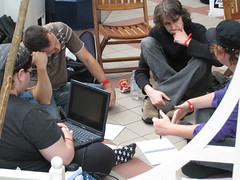Even after seeing Hack Day work internally a bunch of times and now twice in the open format with external developers I’m still amazed every time. There’s something magical about the event.

Yes, ok, obviously, if you attract a bunch of creative people, give them the right kind of stage to express themselves and an audience of peers to listen to them then you are going to be surprised one way or another. And if you add some rules that make it feel like a game, then the competitive spirit will naturally motivate people to reach further.
It seems obvious now, but it amazes me all the same. I’ve never really experienced anything quite like it in the workplace.
In many ways, the experience both as a host and as a participant at the event feels similar to the intensity and even panic you get working at a startup that suddenly feels like it’s turning the corner. Everyone is operating at full speed. You know you’re on to something hot. But you have no idea what will happen next…and you’re pretty sure that you will fail if you stop running at full speed.
It’s also a little bit like the mid point in the sport season when you’re on a team that might actually win the championship this year. You know you can do something great, but you have to focus and make it happen. Intuition takes control of every decision. There’s no time for analysis.
One of the powerful lessons of Buddhism is the idea of letting go of the things we want to control. It’s incredibly difficult to throw an event where the outcome is so completely unknown. I can’t tell you how much time and energy we spend trying to remove all the rules and controls and precedents that come with being at a high profile company like Yahoo! in order to run Hack Day the right way.
 Asking people to understand the event without experiencing it is a tall order. There’s always a “this will never work” look on their faces while you tell them that we invite a bunch of people over to build stuff. And then comes the panic while the actual hacking phase of the event silences the socializing aspect from earlier in the day. It can be uncomfortable hosting a party for a bunch of people who aren’t talking to each other.
Asking people to understand the event without experiencing it is a tall order. There’s always a “this will never work” look on their faces while you tell them that we invite a bunch of people over to build stuff. And then comes the panic while the actual hacking phase of the event silences the socializing aspect from earlier in the day. It can be uncomfortable hosting a party for a bunch of people who aren’t talking to each other.
This long quiet period carries on into the night, essentially a hum of keyboards banging away and murmers amongst team members, where you start to wonder if any of the hacks will be any good or if there will be enough to present or if anybody even cares. Part of you also knows the magic is happening right now…brains are crackling and the creative fire is blazing amongst these people who are intently focused on their computer screens.
The demos are a good indicator of the success of the event, but reading the follow up posts out in the blogosphere brings it home for us as hosts. Like the bride and groom after a wedding, we’re never totally sure how well the event went until people tell us. Here are some of my favorite quotes about Hack Day London:
Josh Clark: Lightning! Blimps! Submarines! And, um, Machine Tags!
The event was thoroughly engaging and altogether humbling. The amount of know-how, creativity and sheer geekery in the room was overwhelming. It’s just plain exciting to be part of a profession and community whose frontiers are expanding so fast.
Neil Ford
All in all, it was a fantastic, if tiring, two days. The total number of hacks presented at the end was 73, all of which were of a superb standard. I think it was impossible to leave the event uninspired.
Ryan Morrison: Land of the Living
I loved the event, I had one of the best times of my life and it’s re-inspired my love of getting down and dirty with code.
It’s incredibly gratifying to know that people enjoy the event as much as we enjoy putting it on. It isn’t an easy event to run, and knowing that people get something real out of it makes it all worth it.
If you were there at Alexandra Palace at Hack Day, we would love to hear what you’d like to see next time. We’re always looking to improve it. We’re watching the blogosphere, so post away, or feel free to comment.
Photo: Andy Piper
 They had a fully catered event including an open bar with some good whiskey. The schwag bag included the Flip digital video camera (wow!). There were a small handful of very basic demos on the floor from the usual suspects (Slide, iLike, Flixster, etc.). And the presentation was short and sweet so we could get back to socializing.
They had a fully catered event including an open bar with some good whiskey. The schwag bag included the Flip digital video camera (wow!). There were a small handful of very basic demos on the floor from the usual suspects (Slide, iLike, Flixster, etc.). And the presentation was short and sweet so we could get back to socializing.


